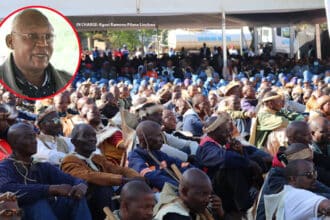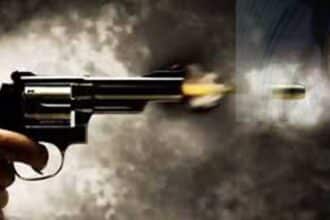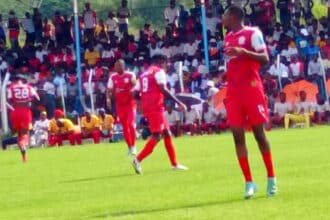On 11 March, the World Health Organisation declared coronavirus (COVID-19) a global pandemic.
Despite this, the virus has since gone on to claim thousands of lives, with the majority of the casualties occurring in the western world.
In light of this, and with the virus rapidly spreading across South Africa, this week Cyril Ramaphosa and his government called an emergency 21-day lock-down, which comes into effect on Thursday (26th March).
Although no-one has tested positive for the virus in Botswana yet, the country remains on high alert.
The Voice’s DANIEL CHIDA engaged party leaders to find out what they believe needs to be done to prevent the virus from spreading to Botswana.
Umbrella for Democratic Change (UDC) Head of Communications: Moeti Mohwasa
This situation requires total mobilisation, cooperation, selflessness and true leadership. We can make it as a nation if we are united and disciplined.
Aggressive measures need to be put in place to prevent the spread of the virus.
Fortunately, up to now, there has not been any reported cases of the virus in the country.
This, however, does not mean that there are no cases as the viruses could stay in the body for sometime before signs are exhibited.
Our actions today will determine what will happen tomorrow.
We can learn from the experience of those who did not take prompt action to deal with this scourge.
Due to limited Intensive Care Units (ICU)s and the already stretched health facilities and personnel, we need to be much more proactive in preparing ourselves for the virus.
These two are among the determining factors of the death rate.
We cannot stop the spread of the virus, but we can manage it if we keep the rate of infection within the capacity of our health facilities.
We should prepare an army of health professionals, including those who are unemployed for any eventuality.
As the UDC, we call upon the government to engage the political, business, workers, religious, sport and other leaders to come up with a common and harmonious strategy to deal with this situation.
There should be provision of free masks and gloves accompanied by sanitisation of public places.
We should embark on immediate and extensive testing of our people for early detection and determination of the extent of the scourge.
Staying at home helps deal with control of infections but what about those who stay in crowded conditions at all times?
Measures have to be put in place to protect our people, the majority of whom are poor, in the event we have a total lock-down.
They will be hard-hit as they go home to empty pantries every evening, prompting them to go out every morning in search of something to eat.
We call upon the government to come up with a coordinated and comprehensive economic stimulus to benefit SMMEs and workers, not leaving out the vulnerable groups like the disabled who have a history of being marginalised and excluded.
An independent structure, totally not biased in favour of the politically connected big business, should be put in place to oversee and monitor the stimulus package.
All these efforts and many others would require the presence and supervision of the Head of State, who unfortunately we are told is now quarantined and not fully available to deal with the challenge we are facing.
It is regrettable and very unfortunate that the President decided – at a time when he was needed most – to leave the country.
He not only deserted the nation that looked up to him to shepherd sheep, but broke the very rules he set for state officials, that there should be no international travel; thereby failing to lead by example. This has led the country to have a present but absent president.
Secretary General of Alliance for Progressives (AP): Phenyo Butale
South Africa took an absolutely correct decision, and there is no choice in the circumstances. Human life comes before everything.

Our region is so integrated that even though we have no known case, we have to do what is necessary to enforce what we already have in place.
Some of our people are still entertaining gatherings of more than 100 people. AP is concerned about ensuing economic ramifications globally, which will adversely affect our economy, particularly the more vulnerable.
So, as per our policy address on Thursday, we call on government to engage and finalise preliminary fiscal response interventions to mitigate effects on the lives of so many of our people.
President of Botswana Movement for Democracy (BMD): Sidney Pilane;
I have studied the statement by President Ramaphosa in which he exempted essential services – and goods – such as the production of food and other necessities, which will continue as before the lock-down.

A few of our entry points with South Africa remain open to enable trade to continue and necessary travel by our respective citizens to continue.
So, the lock-down will affect us very little, and I can think that we may lose some South African tourists and the passing trade of travellers to Botswana.
I have also followed and carefully studied the response of the Botswana government to the crisis that we face.
They are reasonably satisfactory, with one glaring exception; there is no public education programme being implemented.
Written statements and occasional statements in the media by the President, the Office of the President and by the Ministry of Health are far from satisfactory.
We need an intense and sustained publicity blitz that reaches all Batswana, one similar to that of HIV AIDS, to enable all Batswana to become aware of the depth of the crisis that faces the country because coronavirus is coming to Botswana, however long it takes.
I saw a statement by the Police Service demanding compliance with restrictions and making threats.
That is the wrong tone. I suspect that the BDF may also be deployed. We do not want Botswana to become a police state.
We will be watching closely how law enforcement deals with this, and it is my hope that they will exercise appropriate restraint. We will not accept police state tactics.
Compliance with restrictions – something with which we all agree – is best achieved by a proper programme of extensive and sustained public education and not force. The more the education, the less will be the need for enforcement by law enforcement.
Government has decided to go it alone. This is a national crisis and should be owned by all of us and not just the government.
This is the only way the entire nation can take responsibility.
The role of the government is to provide leadership, but not to exclude the nation in that leadership.
This is not a partisan matter.A complete lock-down is the best guarantor of a minimum spread of this silent, invisible enemy which is waging guerrilla warfare on the world. A lock-down requires a lot of money.
Government has a budget for its employees to 31st March, 2021 and can afford to pay them.
Not so with workers in the private sector. Most businesses in Botswana are small scale.
A lock-down means they are not earning revenue and income, are not selling, are unable to pay rent, employees who are not at work, and are unable to meet their other costs. Their employees who will be at home cannot survive without income.
Shops will be affected as they may not have enough consumers to sell to.
The economy could collapse. A meltdown could occur such as happened in Zimbabwe and Venezuela.
Government must have plans in place to prevent this happening. We need to know what the Government plans to approach these possibilities.
*Unfortunately, the Botswana Democratic Party (BDP) had not responded to our reporter’s questionnaire at the time of going to press.







